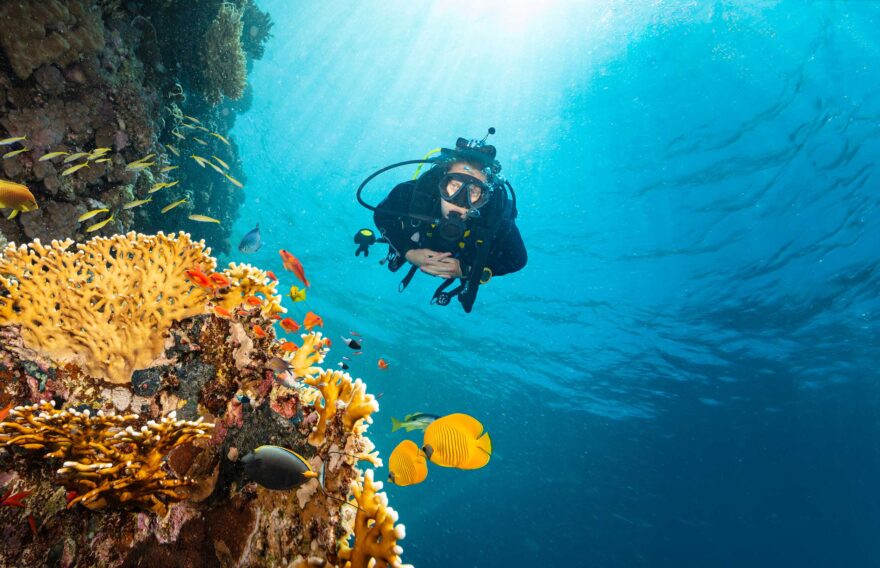
Image by Lukas Gojda, Shutterstock
ActionHub and its parent company were paid a fee to publish this article unedited. The views or opinions expressed here are those of the author and may not reflect those of ActionHub or any of its affiliates.
Scuba diving opens up a mesmerizing world beneath the waves, offering adventurers a thrilling gateway to underwater exploration. Selecting the right location and equipment is vital for ensuring both safety and enjoyment during your first dive experience. This guide serves as a friendly, instructive tool to help beginners confidently take the plunge into open waters.
Scuba diving introduces you to vibrant marine life and awe-inspiring underwater landscapes, making it an exhilarating activity for those seeking adventure. As a beginner, choosing a dive destination with stable weather conditions, mild currents, and excellent visibility enhances your experience. Equally important is having the right gear that fits well and functions reliably, ensuring your safety beneath the surface. A well-equipped scuba diving shop often provides rental options if you’re not ready to purchase your own gear. This guide will walk you through selecting beginner-friendly dive spots and essential equipment, setting you on the path to becoming a confident diver.
Choosing your First Dive Destination
When selecting a location for your first dive, look for sites renowned for stable weather, mild currents, and clear visibility. These factors contribute to a more relaxed and enjoyable experience, allowing you to focus on honing your skills rather than battling challenging conditions. Coastal spots with calm waters or inland quarries are ideal choices for novices as they offer predictable conditions without the unpredictability of strong tides.
Additionally, prioritize destinations that boast well-known training facilities or guided services catering specifically to beginners. Having access to experienced instructors can significantly boost your confidence as they provide invaluable insights into safe diving practices. Opting for locations where instructional support is readily available ensures you can learn essential skills in a controlled environment before venturing into open waters.
Remember, the key to a successful first dive lies in finding a site that matches your comfort level while providing opportunities for growth. By choosing wisely, you’ll lay the groundwork for future adventures in more challenging environments.
Essential Equipment for New Divers
The foundation of any successful scuba diving experience is having the right equipment. At the core of this gear are items like masks, snorkels, fins, buoyancy control devices (BCDs), regulators, and wetsuits. Each piece plays a vital role in ensuring your comfort and safety underwater. For example, a well-fitting mask prevents water leakage while providing clear vision, whereas fins allow efficient movement through the water with minimal effort.
A buoyancy control device (BCD) helps maintain neutral buoyancy, allowing you to hover effortlessly at various depths. Meanwhile, a regulator delivers air from your tank to your mouthpiece, making breathing underwater possible. A wetsuit provides thermal insulation and protection against potential abrasions or stings from marine life.
When selecting scuba gear, prioritize proper fit and reliable functionality above all else. Investing in quality equipment tailored to your needs enhances not only safety but also enjoyment during dives.
Finding the Right Scuba Diving Shop
Visiting a reputable scuba diving shop is essential when preparing for your first dive adventure. Not only do these shops offer an extensive range of gear options suitable for beginners; they also provide expert advice tailored specifically to individual skill levels.
Knowledgeable staff members can guide you through selecting equipment that aligns perfectly with your needs while addressing any concerns or questions along the way. Whether you’re purchasing gear or opting for rentals until you gain more experience—having access to professional insights ensures informed decision-making.
Preparing for Your First Open Water Experience
Before embarking on an open water dive adventure as a beginner diver — consider enrolling in certified training courses conducted by qualified instructors who specialize in teaching newcomers essential skills such as mask clearing or regulator recovery techniques within controlled environments like pools.
This preparation not only boosts confidence but also equips you with valuable knowledge necessary when exploring real-world scenarios under varying conditions found within natural bodies of water around popular dive destinations worldwide — making each subsequent exploration safer overall! Remember always stay informed about local regulations regarding eco-friendly practices aimed at preserving delicate ecosystems encountered during journeys beneath oceanic surfaces alike those seen throughout many regions today!
Taking the Plunge: Safety and Comfort Tips
Your first open water dive should be both exciting and safe. Embrace the buddy system by diving with a partner who can assist if needed; keep communication frequent throughout every stage from descent through ascent phases alike! Monitor air supply closely while maintaining awareness surrounding environmental changes encountered along chosen routes taken below sea level too!
By selecting beginner-friendly dive sites equipped with appropriate gear — you’ll embark upon unforgettable adventures into aquatic realms filled with wonderment awaiting discovery beyond imagination itself!
 Your Privacy Choices
Your Privacy Choices